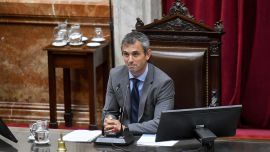At midnight on March 17, Paraguay closed down the Friendship Bridge to Brazil. It was the first time in more than half a century that traffic stopped on the emblematic land link between the two South American neighbours, where 1.5 million people cross every year. Brazil has sealed its land borders with eight neighbours, while Colombia banned all incoming flights for a month, whether carrying foreigners or Colombian nationals.
With the novel coronavirus on the wing, shutting down is part of the new global normal. The danger in Latin America is that such sweeping measures feed the tempting illusion that walls, wilfulness and nativism are the way to beat a threat that is already ubiquitous and flourishes amid official fumbling and crowd-pleasing obscurantism.
Of course individual nations must take aggressive measures to fight the spreading outbreak and the economic affliction it will bring. By early March, well before most Latin American heads of states imposed lockdowns, Covid-19 had already gone native, no longer driven by returning international travellers but by accelerating community infection.
Still, air-gapping a hemisphere is risky, and not just because Latin America’s fortunes rise or fall on the exchange of goods, tourism and services. The Americas is also a region where international cooperation, multilateral institutions and diplomacy have repeatedly made the difference between social wellbeing and hardship.
Imported menace
Unfortunately, an imported menace is a gift to national leaders already facing a credibility gap and collapsing approval ratings. “Most of the region’s leaders were already in serious trouble, with slowing economies, social pressures and protests forcing them to look inward,” said Michael Shifter, president of the Inter-American Dialogue. “With borders closing everywhere, the coronavirus has only accentuated that instinct.”
Going into a political crouch won’t help. “The current emergency has everything to make the nationalists in charge even more isolationist,” said Monica de Bolle, senior fellow at the Peterson Institute for International Economics. “That’s a huge problem because the world economy is already heading for a huge fall, and leaders who want to act each on their own will only end up increasing the cost of the pandemic, economically and in terms of public health.”
In fact, Latin America’s recent history has good examples of multilateral institutions stepping up to keep regional markets working and cushioning the blow of recession. The International Monetary Fund, World Bank and Inter-American Development Bank helped to blunt Latin America’s rolling debt crisis in the 1980s and 1990s. In the aftermath of the 2008 financial collapse, coordinated international fiscal stimulus prevented regional commodity prices from crashing, and the US Federal Reserve allowed foreign central banks to swap their wobbly currencies for dollars and stave off an international liquidity crisis.
Multinational pacts against graft and money-laundering proved crucial to local prosecutors striving to bring political scoundrels and their corporate enablers to justice. The recent re-election of the Organisation of American States secretary general Luis Almagro, who marshalled a hemispheric rebuke to Venezuelan autocrat Nicolás Maduro and beat Maduro’s candidate for the job, is a sign that regional commitments to democracy, the rule of law and human rights still matter.
Yet signs of disarray and disjointed policies are everywhere. Fearing the virus’s onslaught, Ecuador’s lawmakers are pushing for a debt moratorium. Bolivian authorities are weighing a state of siege to enforce a nationwide quarantine that many fear will bring even more hardship to one of South America’s poorest nations. Riots claimed 23 lives in a Colombian prison on Sunday as inmates in overcrowded cells panicked over the coming contagion. El Salvador, invoking health safeguards, unilaterally suspended incoming flights of its deportees from the United States, which Washington had maintained despite the outbreak.
Take a cue
The political establishment might take a cue from the health community, which has long looked across borders for institutional support, best practices and knowledge. Two decades ago, the .. Centers for Disease Control and Prevention (CDC) successfully engaged its Mexican counterpart to screen and treat migrants for tuberculosis, a once-forgotten disease which thanks to drug resistant bacilli has made a comeback — an initiative overshadowed by the Donald Trump administration’s talk of a border wall as the best prophylactic.
The CDC also helped countries across the Americas ramp up an epidemic intelligence network to identify and track new and reemerging diseases. One legacy of that effort is Brazil’s EPISUS, an arm of the bold if underfunded universal healthcare system, whose corps of researchers and field investigators is keeping tabs on coronavirus as it sweeps the region’s largest nation. The Pan American Health Organisation has organised several national vaccination campaigns in the Americas, a crucial initiative at a time of resurgent measles and anti-vaccine chest thumping. It also provided expertise and research to nations battling mosquito-borne scourges like Zika and especially chronic dengue fever, which sickened more than three million people in the Americas and killed 1,538 last year.
What’s missing is a strategy to connect the dots. Yes, Latin America holds scores of meetings on vaccination and recurring diseases such as dengue, but it has no regional crisis and response program. “Creating a G20-style mechanism for Covid-19 — and future pandemics — should be at the top of the agenda,” Robert Muggah, who studies global governance and security at the Brazil based Igarape Institute, told me.
'Ideologically fractured'
Here is where the lacuna in Latin America leadership becomes critical. “The region is ideologically fractured, with conservatives in power in Brazil, Colombia and Chile and leftists running Argentina and Mexico,” said Benjamin Gedan, senior adviser to the Latin American Project at the Wilson Center. “That has provoked a tragicomic game of musical chairs, as Mexico leaves the Lima Group, Uruguay returns to the Rio Treaty, Brazil ditches CELAC [the Community of Latin American and Caribbean States], and on and on. When it comes to multilateralism, Latin America has never lived up to its lofty aspirations, and the region's history is littered with castaway acronyms.”
Can disaster focus leaders’ minds? True, Brazilian President Jair Bolsonaro has consistently low-balled the disease even as it swept the country and contaminated 22 of his own aides. Yet Peru’s Martín Vizcarra has acted decisively, listened to health experts and reached out to Beijing — not only for counsel but also reportedly to build his own Wuhan-style prefabricated hospital in the Andean nation ahead of the outbreak.
“In times of adversity, leaders appear,” said de Bolle. That may sound like wishful thinking, but indulging political solipsism is far worse, according to de Bolle, who is writing a book on nationalism and development. “Look at post-war Spain under Franco, a country in tatters which banked on economic autarky, saw gross domestic product plummet and took decades to catch up to the rest of Europe,” she said. “Every time nations tried to go it alone they failed terribly.”
That’s a syndrome even more deadly than coronavirus.






















Comments